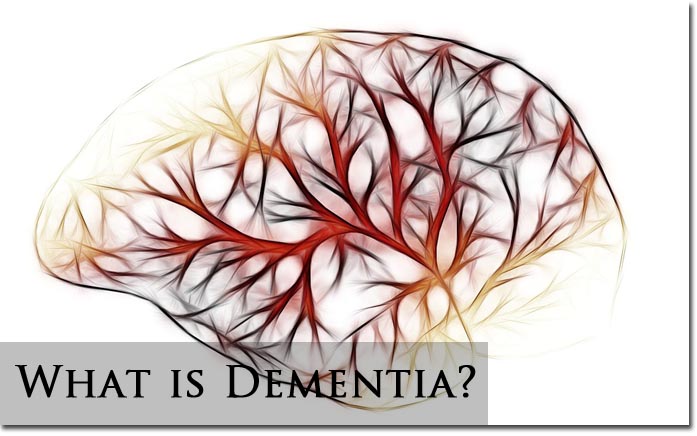What Is Dementia?

An In-Depth Look At Dementia
Dementia isn’t just an individual disease by itself, but is usually a common term to describe the symptoms of deterioration in thinking, communicating, and memory. Although the likelihood of having this disease develops with age, it is not considered a typical part of aging.
What Are The 5 Top Causes Of Dementia?
Neurodegenerative Cause – Is the process of where the brain cells (neurons) break down and die.
Cerebrovascular Cause – Is a common type of dementia where blood vessels in the brain are narrowed cutting off the blood supply.
Infection Associated– A parasite, virus, and some bacteria’s can cause an infection that can lead to dementia.
Toxic and Metabolic Cause – As a result of a chemical imbalance; toxins, such as drugs, malnutrition, or biological factors, can cause dementia.
Traumatic Cause – As a result of concussions, severe brain and head injuries can lead to this disease.
What Are Types of Dementia?
There are a multitude of types of this disease, below are the primary ones.
Alzheimer’s Disease
Alzheimer’s disease is the most general type of this disease, and makes up around Sixty percent of US diagnoses.
Vascular Dementia
Around seventeen percent of individuals established with dementia are going to have vascular dementia. This is the second most general kind of this disease in the over sixty-five range and is created by issues with blood supply to the brain.
Frontotemporal Dementia
Frontotemporal dementia is in reference to a group of dementias that impacts the temporal and frontal lobes of the brain, affecting personality, behavior, speech, and language.
Mixed Dementia
At a minimum one in every ten individuals with this disease is diagnosed as having more than one kind, or mixed dementia.
Lewy Body Dementia
Lewy body dementia is a developing condition that impacts movement and motor control.
Alcohol Associated Brain Damage
Alcohol associated brain damage is caused by excessively drinking alcohol over an extended period.
Posterior Cortical Atrophy
Posterior cortical atrophy is an uncommon form of this disease which an individual typically develops between the ages of fifty and sixty-five and often impacts their sight.
Huntington’s Disease
This disease is a genetic disorder produced by a defective gene on chromosome four.
Parkinson’s Disease
It is estimated that Parkinson’s disease impacts around one in five hundred individuals, with about a 1/3rd of individuals going on to develop dementia in the late stages.
What Are the Different Stages Of Dementia?
Usually, dementia goes through around 7 stages. It also varies depending on what area of the brain that is affected.
1) No Impairment:
Your loved one at this stage will likely show no symptoms, but taking a test may expose a problem.
2) Very Mild Decline:
You may notice minor changes in behavior, but your loved one will still have their independence.
3) Mild Decline:
You will notice more differences in their reasoning and thinking. They may have difficulty making plans, remembering recent events, and they may repeat themselves over and over.
4) Moderate Decline:
They’ll have more of a hard time with making plans and remembering more recent events. They also may have problems with handling money or traveling.
5) Moderately Severe Decline:
They may not remember their own phone number or some of their family and friends names. They may be puzzled about what time of day it is or which day of the week it is. At this point, they will need help with some basic functions, such as picking out what to wear.
6) Severe Decline:
They will start to forget the name of their significant other. They will need using the restroom and eating. You may also notice changes in their emotions and personality.
7) Very Severe Decline:
They can no longer speak what they’re thinking. They can no longer walk and will spend most of their time bedridden.
What are Treatments for Dementia?
Although there is no cure for this disease, there are step you can take to make your loved one’s life a little easier. A good rule of thumb is to eat a healthy diet and get plenty of exercise.
Psychotherapy
Psychotherapy, in a specific behavioral approach, can be used to reduce the recurrence or severity of problematic behaviors, like improper conduct or aggression towards others.
Environmental Adjustments
Adjusting the environment can greatly increase their safety and comfort while decreasing their agitation. Home modifications for safety include removal of hazardous items, such as scissors or forks, harmful chemicals and tools. Use child-proof items like electrical outlet covers and door locks may also be used to limit access.
Medications
Although no medications are available to stop or cure this disease there are medications that can be prescribed to decrease the dementia signs. Nowadays there are many types of drugs available for improving brain function. Usually, other psychotropic and anti-dementia drugs are prescribed.
Find Memory Care Facilities In Arizona
Find memory care facilities in Arizona by visiting SLS Communities.

